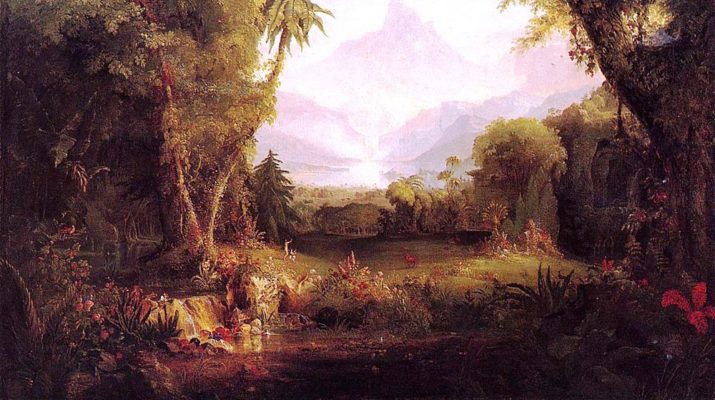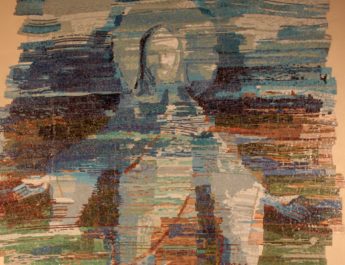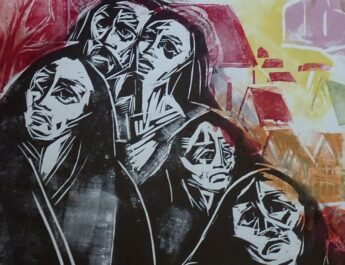Genesis 2:7-9, 15-25
A Women’s Lectionary 15
7 then the LordA GodB formedC manD
A “Lord” = YHVH. From havah (to be, become) or hayah (to come to pass, become, be). This is the name of the God of Israel, the self-existent and eternal one, the tetragrammaton. This pronunciation has been lost to time so “Lord” is generally used in its place.
B “God” = Elohim.
C “formed” = yatsar. Perhaps related to yatsar (to be narrow, distressed, or vexed); perhaps related to tsarar (to bind, restrict, narrow, be cramped, an adversary). This is to fashion or form, perhaps by squeezing something into a shape or form. Particularly, it is to create as a potter does. Figuratively, it is to determine.
D “man” = adam. Perhaps from adam (to be red, make ruddy); related to adamah (ground, dirt, earth). This is man, humankind, also Adam’s name. It refers to a human individual or humanity.
from the dustE of the ground,F and breathedG into his nostrilsH
E “dust” = aphar. May be related to aphar (to throw dust, be dust). This is dust as powdered, perhaps gray colored. It could be ashes, powder, ground, dry earth, clay mud, or rubbish.
F “ground” = adamah. Related to “man” in v7. From the same as adam (see note D above). This is ground, earth, soil as red, or land.
G “breathed” = naphach. 12x in OT. This is to breathe, puff, inflate, scatter, light on fire, make something lose its life.
H “nostrils” = aph. From anaph (to be angry; properly, breathing hard as a signifier of being enraged). This properly refers to the nose or nostril and by extension the face. It can specifically refer to anger or wrath as one breathes hard and nostrils flare in times of great anger.
the breathI of life;J and the man becameK a livingL being.M
I “breath” = neshamah. From nasham (to blow away, pant, gasp). This is a breath or blast – a puff like of wind. It is also a spirit or soul or divine inspiration or intellect. It could also be an animal. This is the word used for the breath of life when humanity was created in Genesis 2:7.
J “life” = chay. From chayah (to live or keep alive literally or figuratively). This is alive, living, lifetime. It can also be used to describe someone’s age. It can refer to animals, plants, water, or a company or congregation of people. It is life in a very broad sense.
K “became” = hayah. Related to “Lord” in v7. See note A above.
L “living” = chay. Same as “life” in v7. See note J above.
M “being” = nephesh. Related to naphash (to refresh or be refreshed). This is soul, self, person, emotion. It is a breathing creature. Can also refer to appetites and desires.
8 And the Lord God plantedN a gardenO in Eden,P in the east;Q and there he putR the man whom he had formed.
N “planted” = nata. To fix or fasten, establish or plant. This is planting in a literal or figurative sense.
O “garden” = gan. From ganan (to put a hedge around – generally, protect or defend; to cover or surround). This is a garden in that it is fenced in. It can also be an enclosure.
P “Eden” = Eden. 16x in OT. Perhaps from the same as eden (luxury, delight, pleasure); from adan (to luxuriate). This is the garden of Eden and also the name of a Levite.
Q “east” = qedem. Perhaps from qadam (to come in front or be in front; to meet, anticipate, confront, receive, or rise; sometimes to meet for help). This is front, formerly, before, east, eternal, everlasting, antiquity.
R “put” = sum. This is to put or place in a literal or figurative sense. It can be appoint, care, change, make, and may other things.
9 Out of the ground the Lord God made to growS everyT treeU that is pleasantV to the sightW
S “made to grow” = tsamach. This is to sprout, grow, or spring up – literal or figurative.
T “every” = kol. From kalal (to complete). This is all or every.
U “tree” = ets. Perhaps from atsah (to shut, fasten, firm up, to close one’s eyes). This is tree or other things related to trees like wood, sticks, or stalks. It can also refer to wood products like a plank or staff or gallows. Additionally, this can refer to a carpenter.
V “is pleasant” = chamad. This is to desire or delight in someone or something. It can also mean something that is precious or coveted. So, it can also refer to lust.
W “sight” = mareh. From raah (to see, show, stare, think, view; to see in a literal or figurative sense). This is sight, appearance, or vision. It can be a view, seeing itself, that which is seen, something real, or a vision one sees.
and goodX for food,Y the tree of life also in the midstZ of the garden, and the tree of the knowledgeAA of good and evil.BB
X “good” = tob. From tob (to be pleasing, to be good). This is good, beautiful, pleasant, agreeable, bountiful, at ease. This word is used for goodness as a concept, a good thing, a good person. This can refer to prosperity and welfare as well as joy, kindness, sweetness, and graciousness. So, this is ethically good, but also enjoyably good.
Y “food” = maakal. From akal (to eat, devour, burn up, or otherwise consume; eating in a literal or figurative sense). This is food, something edible.
Z “midst” = tavek. This is among, middle, in the midst, the center. Perhaps, properly, to sever.
AA “knowledge” = daat. From yada (to know, be aware, see and so understand – includes observation, care, recognition; can also be used as a euphemism). This is knowledge, unawares, cunning, wittingly.
BB “evil” = ra’. From ra’a’ (to be evil, bad, afflict; properly, to spoil – to destroy by breaking into pieces; figuratively, to cause something to be worthless; this is bad in a physical, social, or moral sense; that which displeases, to do harm or mischief, to punish or vex). This is bad, disagreeable, that which causes pain, misery, something having little or no value, something that is ethically bad, wicked, injury, calamity. This refers to anything that is not what it ought to be – a natural disaster, a disfigurement, an injury, a sin.
15 The Lord God tookCC the man and putDD him in the garden of Eden to tillEE it and keepFF it.
CC “took” = laqach. This is to take, accept, carry away, receive. It can also have the sense of take a wife or take in marriage.
DD “put” = yanach. Perhaps from the same as nuach (to rest, calm, camp, free, place, remain, satisfy, settle, station, or wait; implies settling down in a literal or figurative sense). This is to lay down, let alone, pacify, cast down, or deposit. It can also mean to allow something or someone to stay.
EE “till” = abad. This is to work, serve, or compel. It can describe any kind of work or service (including religious devotion). Also, till or cultivate. Used causatively, it can mean to enslave or keep in bondage.
FF “keep” = shamar. This is to keep, watch, or preserve. It means to guard something or to protect it as a thorny hedge protects something.
16 And the Lord God commandedGG the man, “You may freely eatHH of every tree of the garden; 17 but of the tree of the knowledge of good and evil you shall not eat, for in the dayII that you eat of it you shall die.”JJ
GG “commanded” = tsavah. This is to charge, command, order, appoint, or enjoin. This is the root that the Hebrew word for “commandment” comes from (mitsvah).
HH “freely eat” = akal + akal. Related to “food” in v9. See note Y above. The word is repeated twice – the first time as an Infinitive Absolute. The Infinitive Absolute serves to emphasize the sentiment of the word. It is rather like Foghorn Leghorn’s speech pattern, “I said, I said.”
II “day” = yom. Root may mean being hot. This is the day in a literal or figurative sense. It can also mean birth, age, daylight, continually or other references to time.
JJ “die” = mut + mut. This is to die in a literal or figurative sense. It can also refer to being a dead body. The word is repeated twice – the first time as an Infinitive Absolute. The Infinitive Absolute serves to emphasize the sentiment of the word. It is rather like Foghorn Leghorn’s speech pattern, “I said, I said.”
18 Then the Lord God said, “It is not good that the man should be alone;KK I will makeLL him a helperMM as his partner.”NN 19 So out of the ground the Lord God formed every animalOO of the fieldPP and every birdQQ of the air,RR
KK “alone” = bad. From badad (to divide or be separated; alone, solitary, lonely, isolated, straggler). This is apart, alone, separation, body part, tree branch, except. It can also be a city’s chief.
LL “make” = asah. This is to make, do, act, appoint, become in many senses.
MM “helper” = ezer. From azar (to help, protect, support, ally; properly, to surround so as to provide aid). This is help, aid, or helper. This word is used in Genesis 2:18 when God decides to make for Adam, “a helper as his partner.” If the same word can be used of God’s help (as in Psalm 121:1), then we should not downplay the significance of this formulation of “help.”
NN “partner” = neged. From nagad (to declare, make conspicuous, stand in front, manifest, predict, explain). This is in front of, opposite to. It can refer to a counterpart or partner, one corresponding to or in the sight of.
OO “animal” = chay. Same as “life” in v7. See note J above.
PP “field” = sadeh. This is literally field, ground, soil, or land. It can be used to mean wild like a wild animal.
QQ “bird” = oph. From uph (to fly, flee, shine, be weary, be faint). This is a flying creature.
RR “air” = shamayim. Root may mean being lofty. This is sky, the air, or heaven. It is in a dual noun form so this might refer to the part of the sky where the clouds move on the one hand and the part beyond that where the sun, moon, and stars are on the other hand.
and broughtSS them to the man to seeTT what he would callUU them; and whatever the man called every living creature,VV that was its name.WW
SS “brought” = bo. This is to enter, come in, advance, fulfill, bring offerings, enter to worship, attack. It can also have a sexual connotation.
TT “see” = raah. Related to “sight” in v9. See note W above.
UU “call” = qara. This is to call or call out – to call someone by name. Also used more broadly for calling forth.
VV “creature” = nephesh. Same as “being” in v7. See note M above.
WW “name” = shem. Related to “put” in v8. May be from sum (see note R above). This is name, fame, renown. A name was thought to indicate something essential about a person – something about their individuality. So, this word can also mean honor, authority, or character.
20 The man gaveXX names to allYY cattle,ZZ and to the birds of the air, and to every animal of the field; but for the man there was not foundAAA a helper as his partner. 21 So the Lord God caused a deep sleepBBB to fallCCC upon the man, and he slept;DDD
XX “gave” = qara. Same as “call” in v19. See note UU above.
YY “all” = kol. Same as “every” in v9. See note T above.
ZZ “cattle” = behemah. This is animal or cattle. It is often used of large quadrupeds.
AAA “found” = matsa. This is to find, catch or acquire. It can also mean to come forth or appear. Figuratively, this can mean to meet or be together with.
BBB “deep sleep” = tardemah. 7x in OT. From radam (asleep or sleeper; a heavy sleep – being stupefied either of sleep or death). This is a deep sleep, lethargy, or trance. It is the word used for the deep sleep God put Adam under in Genesis 2:21 as Eve was being formed.
CCC “caused…to fall” = naphal. This is to fall, whether by accident, to fall prostrate, or to fall in violent death. Figuratively, it can refer to personal ruin or calamity, a city falling, an attack or a falling away. It can also be a deep sleep or wasting away.
DDD “slept” = yashen. This is to be languid or go slack. By implication it can mean to sleep, become old or stale, or die.
then he took oneEEE of his ribsFFF and closed upGGG its place with flesh.HHH 22 And the rib that the Lord God had taken from the man he madeIII into a womanJJJ and brought her to the man.
EEE “one” = echad. Perhaps from achad (to unify, continue on a path; figuratively, to gather one’s thoughts). This is the number one, first, united. It can also be alone, altogether, a certain, a few.
FFF “ribs” = tsela. Perhaps from tsala (to limp, be lame). This is rib, side, leaf, plank, side of a person or object; quarter of the sky.
GGG “closed up” = sagar. This is to shut up, imprison, lock, hand over, or figuratively surrender.
HHH “flesh” = basar. From basar (being a messenger, publish, carry preach; properly, this is being fresh, rosy or cheerful as one bearing news). This is flesh, the body, fat, skin, self, nakedness, humankind, or kin. It can also refer to private parts.
III “made” = banah. This is to build, make, set up, restore, repair, or obtain children. It is to build literally or figuratively.
JJJ “woman” = ishshah. From ish (man); perhaps from enosh (human, humankind, mortal); from anash (to be weak, sick, or frail). This is woman, wife, or female.
23 Then the man said,
“This at lastKKK is boneLLL of my bones
and flesh of my flesh;
this one shall be called Woman,
for out of ManMMM this one was taken.”
24 ThereforeNNN a manOOO leavesPPP his fatherQQQ and his motherRRR
KKK “at last” = paam. From paam (to move, trouble; to tap in a regular rhythm; to agitate). This is a beat, stroke, footstep, or occurrence.
LLL “bone” = etsem. From atsam (vast, numerous, strong; to close one’s eyes, to make powerful; to break bones). This is self, life, strength, bone, or substance.
MMM “Man” = ish. Related to “woman” in v22. See note JJJ above.
NNN “therefore” = ken. Perhaps from kun (properly, in a perpendicular position; literally, to establish, fix, fasten, prepare; figuratively, it is certainty, to be firm, faithfulness, render sure or prosperous). This is to set upright. Generally used figuratively to mean thus, so, afterwards, rightly so.
OOO “man” = ish. Same as “Man” in v23. See note MMM above.
PPP “leaves” = azab. To loosen, relinquish, permit, forsake, fail, leave destitute.
QQQ “father” = ab. This is father, chief, or ancestor. It is father in a literal or figurative sense.
RRR “mother” = em. This is a mother as binding a family together or a breeding female animal. It could be mother in a literal or figurative sense.
and clingsSSS to his wife,TTT and they become one flesh. 25 And the manUUU and his wife were bothVVV naked,WWW and were not ashamed.XXX
SSS “clings” = dabaq. This is to follow closely or abide fast, to cling or be joined together. Figuratively, it can mean to catch something by chasing after it, to overtake, or to stick. A man clings to his wife in Genesis 2:24, Shechem was deeply attracted to Dinah in Genesis 34:3, Ruth clung to Naomi in Ruth 1:14, Solomon clung to his foreign wives and concubines in 1 Kings 11:2. It is also used of a tongue sticking to the mouth, pursuing or overtaking as in battle, and also clinging to God.
TTT “wife” = ishshah. Same as “woman” in v22. See note JJJ above.
UUU “man” = adam. Same as “man” in v7. See note D above.
VVV “both” = shenayim. From sheni (double, again, another, second); from shanah (to fold, repeat, double, alter, or disguise). This is two, both, second, couple.
WWW “naked” = arom. 16x in OT. From ur (to be made naked, exposed, or bare) OR from aram (to be cunning, sensible, crafty; to make bare or smooth; usually in a negative sense). This is naked, whether in part or in full. May be related to, “the serpent was more crafty” than any other wild animal” in Genesis 3:1.
XXX “ashamed” = bosh. Properly, this means to be pale, which implies shame, disappointment, or confusion.
Image credit: “The Garden of Eden” by Thomas Cole, 1828.




